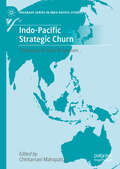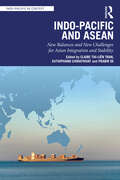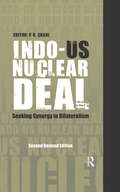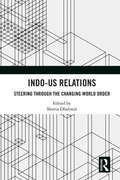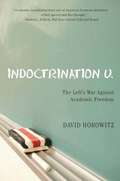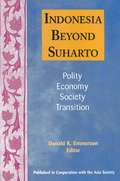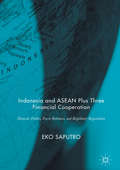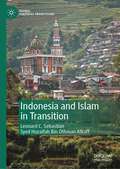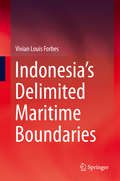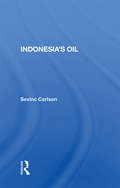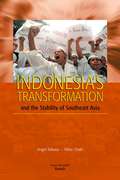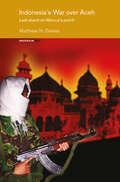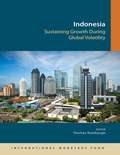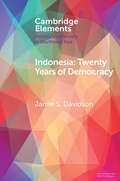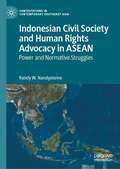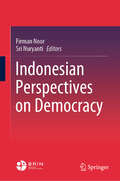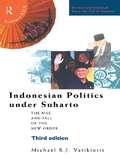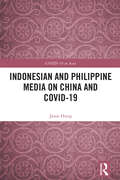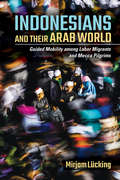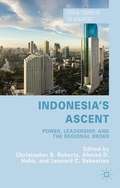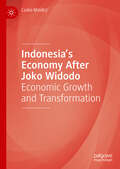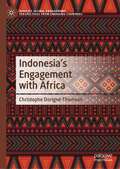- Table View
- List View
Indo-Pacific Strategic Churn: Challenges & State Responses (Palgrave Series in Indo-Pacific Studies)
by Chintamani MahapatraThis book offers a thorough examination and analysis of key developments in the Indo-Pacific region, providing valuable insights for foreign policy professionals, academics, and researchers in geopolitics and international relations. The editor, a long-time observer of Indo-Pacific affairs, has curated contributions from leading Indian scholars, each writing within their area of expertise. This volume is a carefully coordinated effort to present an Indian perspective on the rapid and complex changes in the Indo-Pacific. It offers a comprehensive look at major regional stakeholders, critical strategic challenges to peace and stability, and ongoing non-traditional security issues impacting the area.
Indo-Pacific and ASEAN: New Balances and New Challenges for Asian Integration and Stability (Indo-Pacific in Context)
by Claire Thi Liên Tran, Suthiphand Chirathivat and Prabir DeThis book examines Indo-Pacific issues from a Southeast Asian perspective and goes beyond discourses such as ASEAN–China or ASEAN–US–China. It analyses the new regional balances in the ASEAN and Indo-Pacific region at the diplomatic, strategic and economic levels while taking into account the ongoing uncertainty of the international order, reshaped by the post COVID-19 crisis and characterised by the increasingly adversarial China-US relations, the sensitive context of South China Sea and Taiwan crisis and the impact of the war between Russia and Ukraine. It highlights Indo-Pacific not only from a geostrategic angle but an economic one, considering ASEAN amidst competing connectivity strategies and integration challenges.The book offers an inclusive outlook capturing diversity and convergence of strategies in a key region where the stage of tomorrow’s global order will be decided. It will be of great interest to scholars and researchers of politics and international relations and Area Studies, especially Southeast-Asian Studies and Indo-Pacific Studies.
Indo-US Nuclear Deal: Seeking Synergy in Bilateralism
by P. R. ChariThis book interrogates the Indo-US civil nuclear agreement from its inception in July 2005 to its conclusion in the latter part of 2008 through 12 articles, each of which focuses on different aspects of the deal. They discuss the factors that facilitated the deal, the roadblocks that were encountered, and the implications of the deal for the future of India’s foreign policy, its energy security and the international non-proliferation regime. Together, they address the internal political dynamics in India and the United States in order to present perspectives of both countries.
Indo-US Relations: Steering through the Changing World Order
by Shveta DhaliwalThis book maps Indo-US relations from the turn of the last century. Amidst the changing world order, the bilateral ties between two of the world’s greatest democracies have evolved from the thorny exchanges post-nuclear testing to present-day’s bonhomie. The essays in the volume include perspectives from political scientists, policymakers, and strategic studies experts which renew discussions on Indo-US collaborations and negotiations on a variety of traditional foreign policies issues, such as security, intervention, arms, and terrorism, as well as cover new and emerging issues including climate change and environmental protection, strategic cooperation and maritime partnership, and the role of Indian diaspora in the US economy. The volume will be of great interest to scholars and researchers of political science and international relations. It will also be of use to foreign policy and diplomacy practitioners, career bureaucrats, and government think tanks.
Indoctrination U
by David HorowitzIn 2003, David Horowitz began a campaign to promote intellectual diversity and a return to academic standards in American universities. To achieve these goals he devised an Academic Bill of Rights and created a national student movement with chapters on 160 college campuses. Take No Prisoners is a riveting account of the reaction to Horowitz's campaign by professor unions and academic associations, whose leaderships have been taken over by the political left.
Indonesia Beyond Suharto
by Donald K. EmmersonThis text presents an accessible introduction to the most significant problems facing Indonesia and raises issues for further investigations. It addresses such questions as: how has Indonesia managed to remain one country?; and is there a truly national Indonesian culture?
Indonesia and ASEAN Plus Three Financial Cooperation
by Eko SaputroThis book examines financial regionalism in East Asia has stimulated not only a new architecture for regional governance, but also a transformation in Indonesia's national regulatory framework. As a relatively new phenomenon compared to trade regionalism, financial regionalism has successfully shaped cooperative networks among financial authorities in East Asia. In this incisive new book, Eko Saputro explores how new financial alliances and regulatory frameworks will allow Indonesia to rapidly take a new place at the global table, bringing the explosive growth that other Asian countries have seen to the archipelago nation. This book will be of equal value to academics, policy makers, students, and scholars, both in the region and abroad.
Indonesia and Islam in Transition (Global Political Transitions)
by Leonard C. Sebastian Syed Huzaifah Othman AlkaffThis book focuses on Islam in Indonesia, showcasing the wide range of Muslim organisations, belief systems and movements, together with an analysis of the political behaviour of Indonesian Muslims. It includes an investigation of the structure of groups, organizations, and societies, and how Muslims within the archipelago interact within these contexts. In doing so, it promotes a more nuanced understanding of Indonesian Muslim society by approaching it through the utilisation of scholarly frameworks. Theories related to religion and society are used, especially in characterising the transition of the Indonesian Muslim society from pre-New Order to post-New Order. Particularly significant is Abdullah Saeed's framework in understanding one’s attitude towards key and contemporary issues, originally used to understand one’s attitude towards the religious ‘other’. The authors thus adopt this framework in the book, as a method of categorising people in a diverse society which in turnhelps readers to understand the nuances of Islam and Muslims in a huge country like Indonesia.
Indonesia's Changing Political Economy
by Jamie S. DavidsonIndonesia is Southeast Asia's largest economy and freest democracy yet vested interests and local politics serve as formidable obstacles to infrastructure reform. In this critical analysis of the politics inhibiting infrastructure investment, Jamie S. Davidson utilizes evidence from his research, press reports and rarely used consultancy studies to challenge mainstream explanations for low investment rates and the sluggish adoption of liberalizing reforms. He argues that obstacles have less to do with weak formal institutions and low fiscal capacities of the state than with entrenched, rent-seeking interests, misaligned central-local government relations, and state-society struggles over land. Using a political-sociological approach, Davidson demonstrates that 'getting the politics right' matters as much as getting the prices right or putting the proper institutional safeguards in place for infrastructure development. This innovative account and its conclusions will be of interest to students and scholars of Southeast Asia and policymakers of infrastructure investment and economic growth.
Indonesia's Delimited Maritime Boundaries
by Vivian Louis ForbesThis book examines the delimited maritime boundaries of Indonesia with its neighbours. It features carefully drawn maps based on the geographical coordinates of the defined maritime boundaries; the reproduction of a complete set of the primary documents with direct relation to the boundaries; and a comprehensive narrative on the geography and the historical development of the archipelagic State. Indonesia has an immense maritime domain that encompasses much of the sea between Australia and the Asian mainland. In addition, Indonesia is itself made up largely of water: in excess of 17,000 islands, Indonesia's archipelagic and territorial waters together form about three-fifths of the country's sovereign territory. This book offers readers clear, accessible information on the maritime boundaries of the world's largest archipelagic state.
Indonesia's Oil
by Sevinc CarlsonRanked twelfth in world oil production, Indonesia is already an important supplier of oil to Japan, and may become an increasingly important supplier to the United States. Sevinc Carlson presents here the first up-to-date and comprehensive study of the politics and economics of Indonesia's oil, and emphasizes the importance of oil to the country's
Indonesia's Transformation and the Stability of Southeast Asia
by Peter Chalk Angel RabasaIndonesia, the world's fourth most populous country, is undergoing a profound transformation that could lead to a variety of outcomes, from the consolidation of democracy to return to authoritarianism or military rule, to radical Islamic rule, or to violent disintegration. The stakes are high, for Indonesia is the key to Southeast Asian security. The authors examine the trends and dynamics that are driving Indonesia's transformation, outline possible strategic futures and their implications for regional stability, and identify options the United States might pursue in the critical challenge of influencing Indonesia's future course. Steps the United States might take now include support for Indonesia's stability and territorial integrity, reestablishment of Indonesian-U.S. military cooperation and interaction, aid in rebuilding a constructive Indonesian role in regional security, and support for development of a regional crisis reaction force. A continued strong U.S. presence in the Asia-Pacific region will reinforce the U.S. role as regional balancer.
Indonesia's War over Aceh: Last Stand on Mecca's Porch (Politics in Asia)
by Matt DaviesSince 2001, Indonesia’s military commitment to Aceh province resulted in one of Southeast Asia’s largest wars for decades. Indonesia's War over Aceh presents the background and history of this war, investigating its domestic and international implications, at a time when the recent tsunami catastrophe has brought Aceh to world attention. Using military doctrinal references and extensive, original research, Davies reconstructs reported events, combatant forces, terminology and statistical data to expose many of the war’s sensitive issues. He challenges others’ preceding research by detailing the Indonesian military’s mission, structures, combat strains, and activity within political, operational and paramilitary realms. Drawing on Indonesian-Malay sources normally unseen by the English-speaking world, Indonesia's War over Aceh will be essential reading for regional specialists and those interested in contemporary conflict.
Indonesia: Post-Program Monitoring Discussions--Staff Report; Staff Supplement; Public Information Notice on the Executive Board Discussion; and Statement by the Executive Director for Indonesia
by International Monetary FundA report from the International Monetary Fund.
Indonesia: Sustaining Growth During Global Volatility
by Thomas RumbaughThis book is a compilation of eight selected papers and presentations from International Monetary Fund consultations with Indonesia during 2008-2010. Topics include a regional comparison of high inflation in Indonesia, maintaining fiscal stability under uncertainty, Indonesia's commodity boom and competitiveness, corporate governance and leverage trends, and assessing corporate sector vulnerabilities. The editor, Thomas Rumbaugh, is Division Chief in the Asia and Pacific Department at the IMF. Annotation ©2012 Book News, Inc. , Portland, OR (booknews. com)
Indonesia: Tenth Review Under the Extended Arrangement and Request for Waiver of Applicability--Staff Report; Staff Supplement; and Press Release on the Executive Board Discussion
by International Monetary FundA report from the International Monetary Fund.
Indonesia: Twenty Years of Democracy (Elements in Politics and Society in Southeast Asia)
by Jamie S. DavidsonThis Element argues that after twenty years of democratization, Indonesia has performed admirably. This is especially so when the country's accomplishments are placed in comparative perspective. However, as we analytically focus more closely to inspect Indonesia's political regime, political economy, and how identity-based mobilizations have emerged, it is clear that Indonesia still has many challenges to overcome, some so pressing that they could potentially erode or reverse many of the democratic gains the country has achieved since its former authoritarian ruler, Soeharto, was forced to resign in 1998.
Indonesian Civil Society and Human Rights Advocacy in ASEAN: Power and Normative Struggles (Contestations in Contemporary Southeast Asia)
by Randy W. NandyatamaThis book focuses on how Indonesian civil society organisations interact with ASEAN to shape human rights institutionalisation in the region. Using Bourdieu-inspired constructivist IR as an analytical lens, the book argues that there are pre-reflexive norms that dominate the field of interaction in the region that shape the way civil society organisations operate. This has resulted in the diverging advocacy practices, thus complicating human rights institutionalisation process in ASEAN.
Indonesian Perspectives on Democracy
by Firman Noor Sri NuryantiThis book discusses the extent to which Indonesia's trajectory to democracy has changed its direction toward democratic consolidation. In the case of democratic decline in Indonesia, there are numerous studies conducted in order to explain the challenges facing democratization. However, not many of them demonstrate the existing precursors and symptoms of democratic decline, which this book confronts. The authors unpack the problems that continue to hinder Indonesia's path to democratic consolidation and show that against this decline, Indonesia has experienced a new phase of its democratic life during, and in the immediate aftermath of, the COVID-19 pandemic, whereby the political ecosystem has seen a strengthening of the role of the state. This has, in fact, further complicated Indonesia's democratic transition. This book explains how these challenges impact Indonesia’s trajectory to democracy, drawing from three important approaches of democratic regime studies, encompassing actors, institutions, and norms. These aspects are elaborated upon in relation to various issues facing the country, thus capturing a sweeping picture of the political struggles preventing democratic growth. Relevant to researchers and students studying countries in democratic transition, but particularly the case of Indonesia, this is a novel contribution to understanding the country's developing political landscape.
Indonesian Politics Under Suharto: The Rise and Fall of the New Order (Politics in Asia)
by Michael R VatikiotisThis revised third edition provides an analysis of Suharto's New Order from its inception to the emergence of B.J. Habibie as President. The author reassesses the New Order's origins and its military roots and evaluates the considerable economic changes that have taken place since the 1960s. He examines Suharto's politics and, in a new chapter, the reasons behind the crisis and Suharto's fall.
Indonesian and Philippine Media on China and COVID-19 (COVID-19 in Asia)
by Jason HungThis book studies Indonesian and Philippine English-language printed media outlets to examine how regional public opinions of China and China-made vaccines progressed amid the coronavirus pandemic. By quantifying the presence of certain words, themes, and concepts within the qualitative, textual data of news articles from the most prominent English newspapers in Indonesia (i.e. The Jakarta Post) and the Philippines (i.e. The Philippine Daily Inquirer), the book investigates the trajectories of the regional narratives on Chinese vaccines, Beijing, and China. Through this same methodology, the book also explores indications of the degree of soft power exerted by Beijing through such media outlets in both Indonesia and the Philippines. Analysing how Sino-Southeast Asian relations changed during the COVID-19 pandemic, this book will be a valuable resource to students and scholars of international relations, media studies, and Asian politics.
Indonesians and Their Arab World: Guided Mobility among Labor Migrants and Mecca Pilgrims
by Mirjam LückingIndonesians and Their Arab World explores the ways contemporary Indonesians understand their relationship to the Arab world. Despite being home to the largest Muslim population in the world, Indonesia exists on the periphery of an Islamic world centered around the Arabian Peninsula. Mirjam Lücking approaches the problem of interpreting the current conservative turn in Indonesian Islam by considering the ways personal relationships, public discourse, and matters of religious self-understanding guide two groups of Indonesians who actually travel to the Arabian Peninsula—labor migrants and Mecca pilgrims—in becoming physically mobile and making their mobility meaningful. This concept, which Lücking calls "guided mobility," reveals that changes in Indonesian Islamic traditions are grounded in domestic social constellations and calls claims of outward Arab influence in Indonesia into question. With three levels of comparison (urban and rural areas, Madura and Central Java, and migrants and pilgrims), this ethnographic case study foregrounds how different regional and socioeconomic contexts determine Indonesians' various engagements with the Arab world.
Indonesia’s Ascent
by Christopher B. Roberts Ahmad D. Habir Leonard C. SebastianThis volume explores the domestic and transnational considerations associated with Indonesia's ascent, referring to its rise in terms of hard and soft power and its likely trajectory in the future. The range of contributors analyse economic resources, religious harmony, security, regional relations, leadership and foreign policy.
Indonesia’s Economy After Joko Widodo: Economic Growth and Transformation
by Csaba MoldiczThis book examines the transformation of the Indonesian economy during the presidency of Joko Widodo and the economic policies that have underpinned it, with a particular focus on manufacturing, services and infrastructure development. It not only assesses the current social and economic conditions within Indonesia, but also explores Indonesia's place within the global economy and the important role it will play in the future, particularly with regard to global supply chains. The need to balance technological modernization and capital investment with economic and strategic autonomy is also discussed. This book outlines Indonesia's economic development in recent years and considers the country's potential for further development in the coming years. It will be relevant to researchers and policymakers interested in development economics and economic policy.
Indonesia’s Engagement with Africa (Africa's Global Engagement: Perspectives from Emerging Countries)
by Christophe Dorigné-ThomsonThis book provides a comprehensive study of Indonesia's contemporary foreign policy engagement with Africa, highlighting the archipelago’s recent reawakening to the continent. It explores thoughts on Afro-Asian relations in general and their future in the changing geopolitical context. It provides a vision of Indonesia’s foreign policy and political situation at the highest level of leadership. It places Indonesia in a multi-comparison context, which helps us reconsider Indonesia today and widens our views on Indonesia’s needs to be better known through new perspectives and voices able to better convey the realities of its polity, aspirations, and complexities. It proposes, through the study of Indonesia’s African endeavour, to better grasp the contemporary Indonesian Zeitgeist and Weltanschauung. It also analyses the political power alliance formed by President Jokowi and former General Luhut Binsar Pandjaitan, leading a state-led development through state capitalism, mobilising State-Owned Enterprises (SOEs). The Bandung Conference host aspires to project its domestic development achievements towards Africa, focusing on Africa for Africa and not merely as part of a sometimes-abstract Afro-Asian discourse. Nonetheless, Afro-Asianism continues to be mobilised to facilitate market penetration and serve domestic interests. The book shows how Indonesia’s foreign policy toward Africa relates to domestic political contestation and consolidation, political legacy and commodity-based industrial policy, and Chinese and “China in Africa” networks and ideational influence, foremost among other networks of influence in the Jokowi era. The book also underlines how Indonesia’s knowledge production and academic deficiencies negatively impact its foreign policy capabilities, notably as a potential robust alternative partner for Africa. It will be beneficial for students, academicians, researchers, and diplomats.
